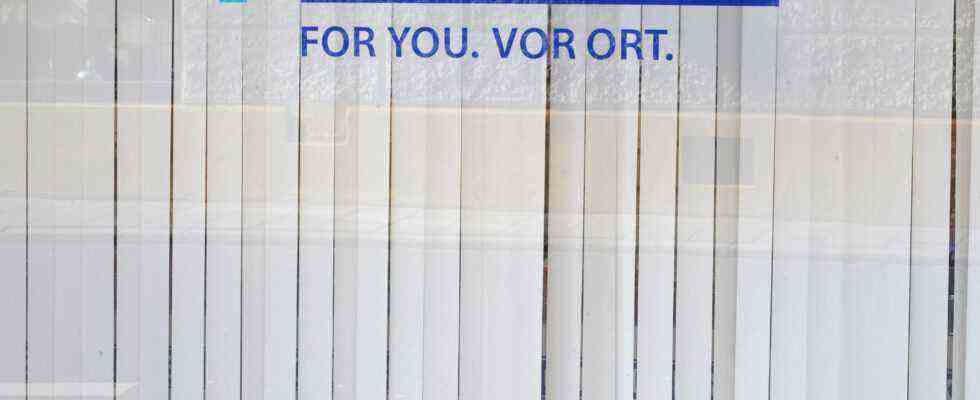Status: 01/23/2022 02:42 am
Schlecker had to file for bankruptcy on January 23, 2012. Europe’s largest drugstore chain disappears from the market. Around 24,000 employees lose their jobs. The bankruptcy proceedings continue to this day.
“It was a shock back then,” remembers Andrea Straub. “I never thought that all Schlecker stores would really close. I had hoped that at least some would survive.” The 55-year-old was working in the Schlecker store in Stetten am Kalten Markt in Württemberg when the news of the company’s bankruptcy came. She learned about it from the media and from customers. Like thousands of others, she loses her job.
Unadorned, but successful
It is mostly women who work for Schlecker. That’s why people often talk about the “Schlecker women”. Straub never liked being called that. And soon after the bankruptcy, she shows that she is not dependent on Schlecker: together with a colleague, she starts her own drugstore in the former Schlecker branch. Their “fulcrum” exists to this day. The shop is bright and friendly furnished. Very different from the Schlecker stores back then.
Narrow shelves in unadorned small shops, plain white lettering on a blue background: This is what the Schlecker concept looked like. What attracts customers are the attractively low prices and the short distances. Because almost every village has its Schlecker market. Ultimately, however, the company loses more and more customers to the competition, losses are made for years, a modernization program comes too late, and Anton Schlecker’s life’s work falls apart.
Anton Schlecker is a trained butcher. For decades he ran his drugstore empire as a “registered merchant”.
Image: picture alliance/dpa
The Empire of the Master Butcher
The company founder was long regarded as a self-made man straight out of a picture book: the trained master butcher from the small town of Ehingen near Ulm opened his first department store in 1967 and the first drugstore in 1974. Just three years later there are more than 100 branches. In the end, Schlecker is the largest drugstore chain in Europe.
However, the company is repeatedly criticized because the establishment of works councils is prevented and the pay is below the standard wage rate. On the other hand, Anton Schlecker impresses with the fact that he is liable for his company with his private assets. He runs his drugstore empire as a “registered merchant”: an extremely unusual construction for a company of this size.
The public has always avoided Anton Schlecker. When it was time to break the bad news of the bankruptcy to the public, he sent his children Lars and Meike ahead. It is the company’s first press conference in more than two decades. There is “no significant fortune left,” explains daughter Meike. It later turns out that, knowing that bankruptcy was imminent, the family had previously set aside millions. The allegations: intentional bankruptcy, delay in bankruptcy, infidelity. Anton Schlecker is sentenced to a suspended sentence of two years and a fine of 54,000 euros. His children have to go to prison: the sentence in 2019 was two years and seven months, and they will be released early in June 2021.
Lars and Meike Schlecker, here a year before bankruptcy, were released early from prison last June.
Image: picture alliance/dpa
24,000 employees without a job
Around 24,000 employees are without a job after the bankruptcy. The insolvency administrator is trying to set up a so-called transfer company for at least some of them. This fails due to the lack of political support. The then Federal Economics Minister Philipp Rösler (FDP) caused outrage when he said that the employees who were made redundant should look for new work themselves, and in this context spoke of their “subsequent employment”.
The insolvency proceedings have not yet been completed. Hardly any bankruptcy has caused so much attention. “It just has a lot of ingredients for an emotional story,” says Patrick Hacker, spokesman for the insolvency administrator Arndt Geiwitz. “Good versus evil. Poor versus rich. Shops that no one really liked but that everyone knew.”
Around 2,800 creditors are demanding more than 1.2 billion euros. In addition, many former employees are still waiting to be paid. And the Federal Employment Agency is entitled to money that it paid to employees during the insolvency; a total of an additional three-digit million amount. The insolvency administrator does not consider it impossible that claims from former employees can still be settled. They are now suing former suppliers for excessive prices. This is how money could come in.
Does Schlecker rise again?
Andrea Straub has also been waiting for around 1,200 euros for previously unpaid overtime for years. “I would be happy about that,” she says. “I have no hope after such a long time.” She is surprised that an Austrian entrepreneur has now announced that he is reviving the Schlecker brand. “I wish the gentleman all the best, but I can’t imagine that the name will still work. It also has a rather negative connotation.”
The pain from back then has gone, she has no time to think about the past. She only remembered the anniversary when representatives of the press wanted to interview her. And she has completely different worries: a supermarket wants to settle nearby. She then had to compete with him for business with the 4,700 residents of the town. She hopes that she can convince with delivery service and an extraordinary range of products. “We’re not giving up without a fight,” says Straub. A sentence that she also said ten years ago.

